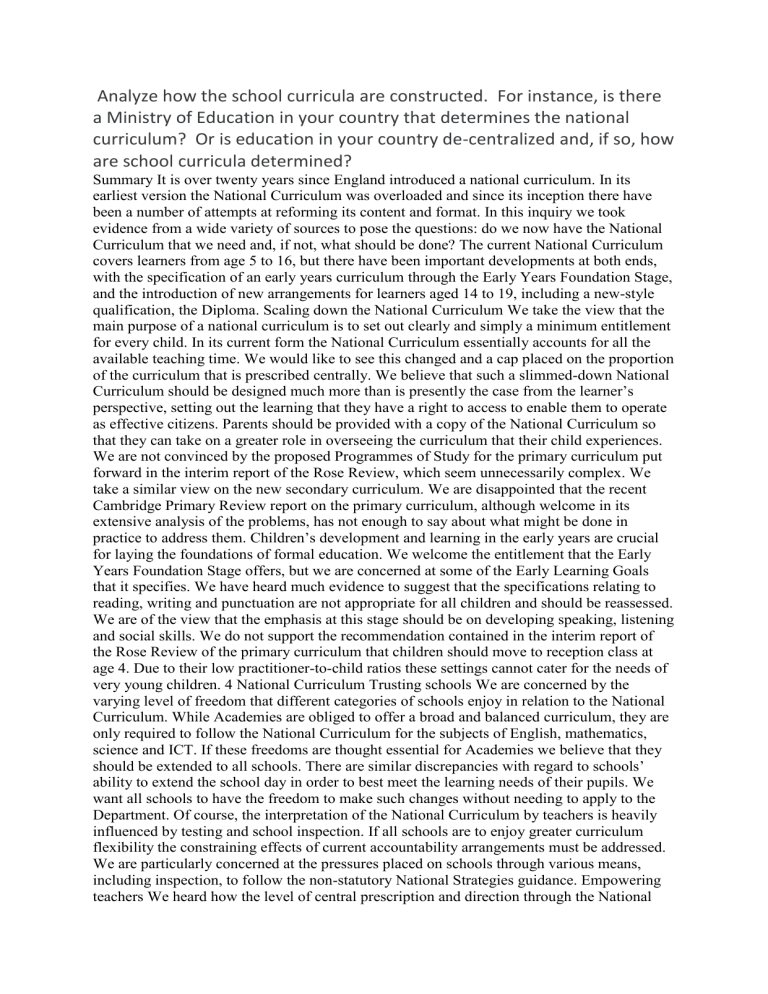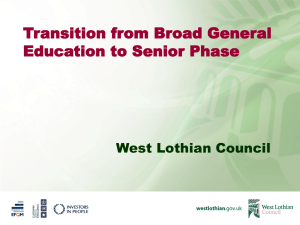
Analyze how the school curricula are constructed. For instance, is there a Ministry of Education in your country that determines the national curriculum? Or is education in your country de-centralized and, if so, how are school curricula determined? Summary It is over twenty years since England introduced a national curriculum. In its earliest version the National Curriculum was overloaded and since its inception there have been a number of attempts at reforming its content and format. In this inquiry we took evidence from a wide variety of sources to pose the questions: do we now have the National Curriculum that we need and, if not, what should be done? The current National Curriculum covers learners from age 5 to 16, but there have been important developments at both ends, with the specification of an early years curriculum through the Early Years Foundation Stage, and the introduction of new arrangements for learners aged 14 to 19, including a new-style qualification, the Diploma. Scaling down the National Curriculum We take the view that the main purpose of a national curriculum is to set out clearly and simply a minimum entitlement for every child. In its current form the National Curriculum essentially accounts for all the available teaching time. We would like to see this changed and a cap placed on the proportion of the curriculum that is prescribed centrally. We believe that such a slimmed-down National Curriculum should be designed much more than is presently the case from the learner’s perspective, setting out the learning that they have a right to access to enable them to operate as effective citizens. Parents should be provided with a copy of the National Curriculum so that they can take on a greater role in overseeing the curriculum that their child experiences. We are not convinced by the proposed Programmes of Study for the primary curriculum put forward in the interim report of the Rose Review, which seem unnecessarily complex. We take a similar view on the new secondary curriculum. We are disappointed that the recent Cambridge Primary Review report on the primary curriculum, although welcome in its extensive analysis of the problems, has not enough to say about what might be done in practice to address them. Children’s development and learning in the early years are crucial for laying the foundations of formal education. We welcome the entitlement that the Early Years Foundation Stage offers, but we are concerned at some of the Early Learning Goals that it specifies. We have heard much evidence to suggest that the specifications relating to reading, writing and punctuation are not appropriate for all children and should be reassessed. We are of the view that the emphasis at this stage should be on developing speaking, listening and social skills. We do not support the recommendation contained in the interim report of the Rose Review of the primary curriculum that children should move to reception class at age 4. Due to their low practitioner-to-child ratios these settings cannot cater for the needs of very young children. 4 National Curriculum Trusting schools We are concerned by the varying level of freedom that different categories of schools enjoy in relation to the National Curriculum. While Academies are obliged to offer a broad and balanced curriculum, they are only required to follow the National Curriculum for the subjects of English, mathematics, science and ICT. If these freedoms are thought essential for Academies we believe that they should be extended to all schools. There are similar discrepancies with regard to schools’ ability to extend the school day in order to best meet the learning needs of their pupils. We want all schools to have the freedom to make such changes without needing to apply to the Department. Of course, the interpretation of the National Curriculum by teachers is heavily influenced by testing and school inspection. If all schools are to enjoy greater curriculum flexibility the constraining effects of current accountability arrangements must be addressed. We are particularly concerned at the pressures placed on schools through various means, including inspection, to follow the non-statutory National Strategies guidance. Empowering teachers We heard how the level of central prescription and direction through the National Curriculum and National Strategies has de-skilled teachers. At times schooling has appeared more of a franchise operation, dependent on a recipe handed-down by Government rather than the exercise of professional expertise by teachers. The education system needs confident and well-qualified teachers capable of shaping the best possible education for their pupils. This has implications for the content of teacher training, but also for the role of the Department and its agencies. We want to see the centre to take on a different role to the one it currently has—with much greater emphasis on intelligence gathering and research and development, and less on monitoring and compliance. Curriculum coherence Alongside the extent of central control over the curriculum and its delivery, our other main concern to emerge from this inquiry was the poor level of continuity and coherence in the National Curriculum—and across the National Curriculum, the Early Years Foundation Stage and 14– 19 arrangements. We regret the piecemeal fashion by which these frameworks for learners aged 0 to 19 have been arrived at and subsequently reformed, with the Department instituting reviews of the curriculum for each phase of education separately and in no particular order. In consequence there are the disjunctions in pupils’ learning that have been highlighted by Ofsted among others. We recommend that curriculum frameworks for learners aged 0 to 19 should be reviewed as a whole to achieve continuity and coherence. We see this as being the responsibility of a completely independent curriculum authority. We are concerned that the Qualifications and Curriculum Authority and its proposed successor, the Qualifications and Curriculum Development Agency, lack that essential autonomy. We recommend that an independent curriculum authority be established to keep the National Curriculum refreshed. We suggest that the Early Years Foundation Stage is brought within the National National Curriculum 5 Curriculum and run through the Qualifications and Curriculum Development Agency rather than the Department, and that an overarching set of curriculum aims is introduced that covers learners 0 to 19. There should be a related st I try becos i can only issue after your are cleared & out of SHN & monday MOM is really busy & the appt time depends on available slots Once appt made there is a letter u hv to bring along & the address is there

